Embarking on a journey of self-improvement requires more than just determination; it demands a wellspring of inspiration and motivation. In the current world of continuous learning, the right words have the transformative power to propel us to new heights. Below, you will discover a collection of inspirational training quotes that encapsulate the essence of perseverance, dedication, and the pursuit of excellence. As you delve into each of them, let these words serve as beacons of encouragement, lighting the path toward achievement and personal development!
|
Author: Jonathan M. Pham |
Importance of Employee Training Quotes
“The only thing worse than training employees and losing them is not training them and keeping them.”
Zig Ziglar
Investing in training employees is like planting seeds and nurturing them until they blossom. When a trained staff leaves, it feels like seeing that flower cut and taken away before it fully reaches its potential. The company loses the immediate benefit of their skillset and the return on investment in their training. Additionally, it may disrupt workflows and require finding replacements.
However, the pain of losing talent pales in comparison to the ongoing damage caused by not growing your staff. Think of it like leaving weeds to grow unchecked in your garden. Untrained employees often make mistakes, struggle with maintaining efficiency, feel disengaged, and have difficulty adapting to changing circumstances. Therefore, while losing a talented employee may feel like a temporary setback, failing to develop your workforce altogether creates a chronic wound that bleeds productivity, performance, and even organizational culture.
Investing in employee training is a strategic necessity. It’s like fertilizing your garden – ensuring that your people flourish, benefitting both them and the company’s growth. While some may still decide to go on, the benefits of a skilled and engaged workforce far outweigh the sting of temporary loss.
“Investing in training and development leads to the most significant return on investment a company can have.”
J.P. George
While other investments may yield immediate returns, investing in T&D (Training & Development) is a strategic decision that sows the seeds for long-term growth and prosperity. It’s about nurturing the most valuable asset a company has – its people – and reaping the rewards of a skilled, engaged, and adaptable workforce. The benefits it brings about span across a variety of levels – including:
- Enhanced individual performance: Training equips team members with the skills and knowledge to tackle their roles more effectively. They become more efficient, accurate, and productive, leading to improved output and quality.
- Boosted innovation: T&D fosters a culture of learning and critical thinking – in which people are adept at tackling challenges, generating new ideas, and implementing innovative solutions, propelling the company forward.
- Elevated engagement & talent retention: Feeling valued and equipped with growth opportunities, employees become more engaged in their work and more likely to stay with the company. This reduces costly turnover and fosters a loyal, dedicated workforce.
- Strengthened brand reputation: An organization known for investing in its people naturally attracts top talent and builds a positive employer brand. This translates to better recruitment, higher employee morale, and ultimately, a stronger market position.
In essence, training is not just about maximizing profits; it is an investment in the future of the company and its people, creating a win-win situation for everyone involved.
“Training is not an expense, but an investment in human capital.”
Roy H. Williams
Traditionally, training is often viewed as an expendable line item in a budget, something to be cut back on during tough times. This short-sighted view fails to recognize its true nature – an investment in the company’s most valuable asset: its people.
Employees are not cogs in a machine; they are the brains, the creativity, and the driving force behind a company’s success. Training is like polishing that raw talent, equipping them with the skills, knowledge, and confidence to unlock their full potential. This, in turn, translates to a direct return on investment for the company.
The ROI from training goes beyond quantifiable metrics like increased revenue or reduced costs. Specifically, it fosters a more positive and productive work environment, builds trust and loyalty between team members and the organization, and cultivates a culture of continuous learning and growth. These intangible benefits contribute significantly to long-term success and employee well-being.
Read more: 45 Workplace Wellness Quotes – Beyond the Paycheck
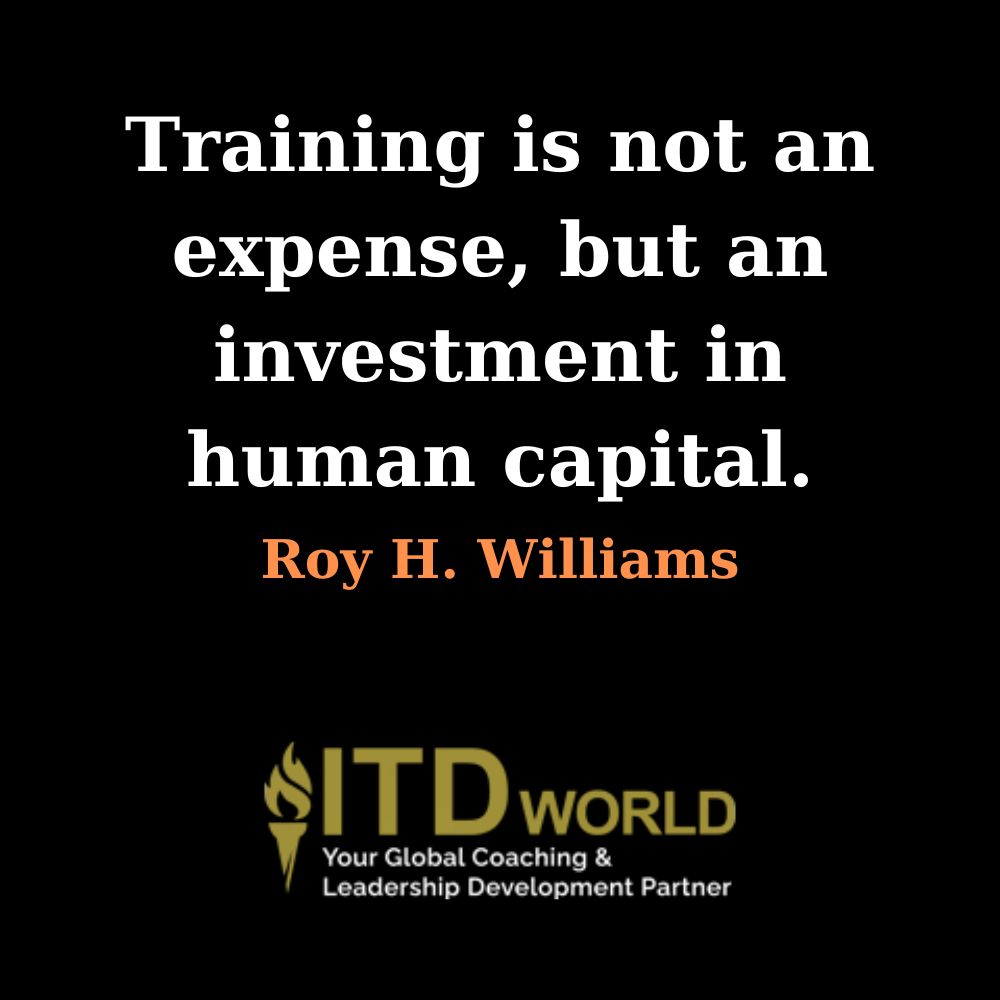
Inspirational training quotes
“In a world of constant change, the spoils go to the nimble and adaptable – those who can learn and unlearn with equal ease.”
Tom Flick
We are presented with a stark reality: change is the only constant in today’s world. Technology gallops forward, industries morph overnight, and market demands twist with the wind. In this perpetual motion, clinging to outdated knowledge or rigid practices is akin to anchoring a ship in a raging storm – a certain disaster awaits.
To weather this storm, businesses and individuals alike must cultivate nimbleness. It is about mental flexibility, the ability to pivot and adjust strategies on the fly. It’s like a dancer gliding effortlessly through changing rhythms, responding in real-time to the music’s whims.
While learning to adapt, we should also be aware of the importance of unlearning – the conscious shedding of obsolete information and ingrained habits. It’s like pruning a bonsai, carefully removing overgrown branches to make room for fresh growth. On one hand, we must be voracious learners, constantly seeking new knowledge and skills to stay ahead of the curve. On the other hand, it is also crucial that we frequently evaluate our current knowledge base and let go of what no longer serves us. This delicate dance – the tango of learning and unlearning – is the key to unlocking the spoils of our dynamic world.
“The goal of training is to create an army of thinkers, not robots.”
Robyn Shulman
In today’s rapidly changing world, businesses need more than just obedient cogs in the machine. They need those who can think critically, quickly grasp new concepts/ approaches, collaborate effectively, and clearly articulate their thoughts/ ideas to influence others.
These are the qualities that separate the thinkers from the robots. Thinkers are the driving force behind progress, the ones who push boundaries and challenge the status quo. They are the problem solvers, the innovators, and the leaders who steer the organization towards success.
So, how do we create an army of thinkers through training? Here are some key principles:
- Focus on understanding, not memorization: Encourage trainees to delve deeper into concepts, ask questions, and make connections.
- Promote active learning: Provide opportunities for hands-on activities, discussions, and problem-solving exercises.
- Embrace diversity of thought: Create a safe space for different perspectives and encourage healthy debate.
- Challenge assumptions: Encourage trainees to question the status quo and think outside the box.
- Provide opportunities for creativity: Incorporate elements of design thinking, brainstorming, and prototyping into training programs.
By implementing the above-mentioned guidelines, businesses may transform training from a sterile exercise in skill acquisition into a vibrant incubator of critical thinking and innovation.
“Employees who believe that management is concerned about them as a whole person – not just an employee – are more productive, more satisfied, more fulfilled.”
Anne M. Mulcahy
This training quote delves into the heart of worker motivation and well-being, weaving a powerful connection between employee perception and their overall performance and fulfillment. It’s like tending to a plant – when nurtured with care and attention to its multifaceted needs, it flourishes.
The core message challenges the traditional, transactional view of employees as mere “cogs in the machine,” solely responsible for fulfilling tasks with little regard for their well-being or aspirations. It emphasizes the importance of recognizing your people as whole individuals with hopes, dreams, and challenges beyond their assigned roles.
When employees perceive genuine concern from their leadership – not just about meeting quotas or maximizing profits, but about their overall development and personal satisfaction – it creates a ripple effect of positive outcomes. By caring for our team members, we cultivate a garden of potential that benefits everyone – the employees, the organization, and ultimately, the entire ecosystem of work.
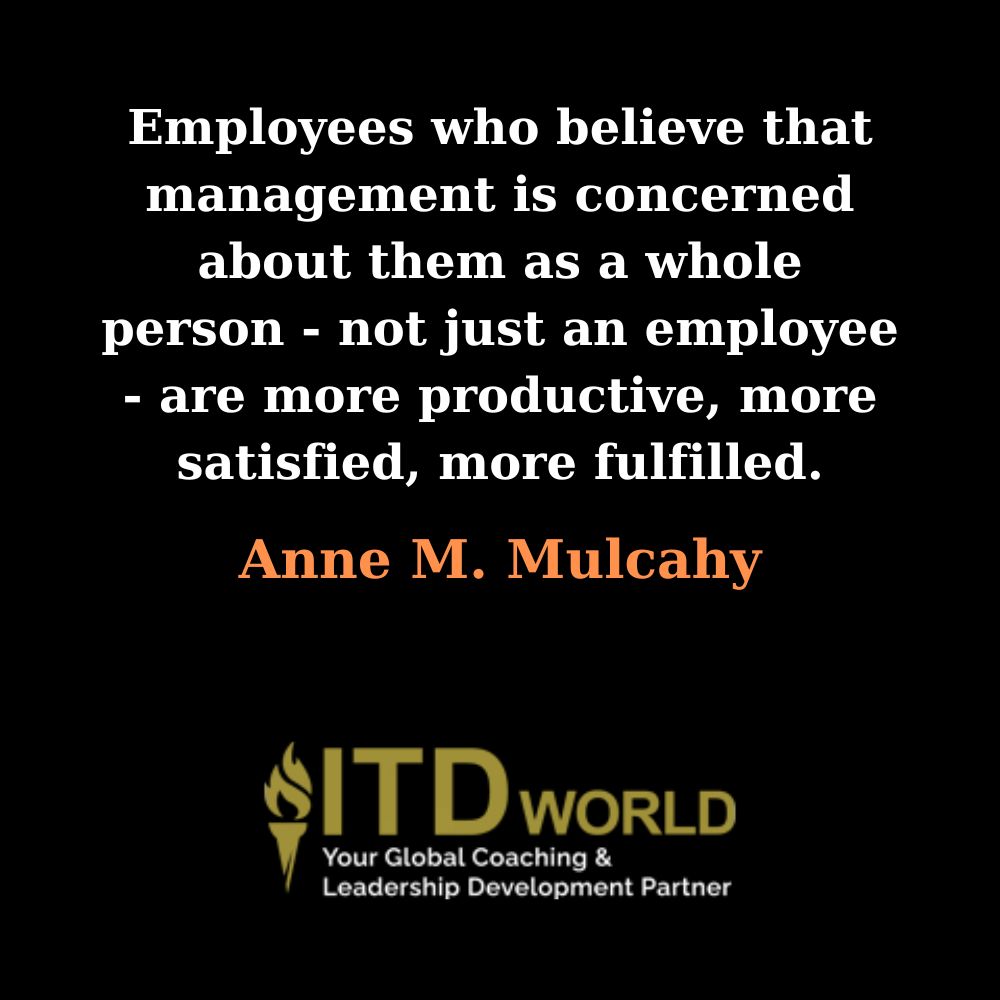
Inspirational training quotes
“Great things in business are never done by one person; they’re done by a team of people.”
Steve Jobs
Training programs, when designed effectively, don’t merely fill skill gaps; they unlock individual potential – by providing employees with the necessary tools and knowledge to perform their individual roles with greater efficiency, and to understand the broader context of their contributions within the team. This fosters a sense of ownership and responsibility, enabling each member to think creatively and proactively within the larger goal.
Imagine a musical ensemble where each instrument shines individually, yet the lack of cohesion creates cacophony. Training serves as the conductor, harmonizing the diverse capabilities of team members. Effective communication skills, collaborative problem-solving techniques, and a shared understanding of company goals bridge the gaps between individual roles, weaving a tapestry of synergy where each member complements and amplifies the strengths of others.
Training builds confidence by providing safe spaces for learning, offering opportunities for constructive feedback, and fostering a culture of trust and open communication. This unleashes a wave of innovation within the team, as diverse perspectives collide and spark groundbreaking solutions. By providing leadership development programs and mentorship opportunities, organizations empower team members to step up, inspire others, and take ownership of projects.
Read more: 80 Employee Engagement Quotes – Building a Thriving Workplace
Famous Inspirational Training Quotes
“The beautiful thing about learning is that no one can take it away from you.”
B.B. King
Training often gets reduced to the mere acquisition of skills, a checkbox ticked on a performance review. But the quote elevates it to a different plane – a journey of personal growth and transformation. The knowledge absorbed, the skills honed, and the insights gained through training become woven into the fabric of our being, enriching our minds and shaping our potential.
Unlike material possessions, knowledge and skills cannot be forcibly taken away. No economic downturn, no corporate restructuring, and no unforeseen event may rob you of what you have learned. It resides within you, an impregnable fortress built with the bricks of understanding and the mortar of practice.
This permanence becomes especially empowering during transitions. If you lose a job, the skills you learned remain, equipping you to navigate the job market with confidence. If you face career changes or personal challenges, your knowledge serves as a compass, guiding you through uncharted territory.
As such, we are all urged to embrace training opportunities – not as obligations, but as investments in our own personal growth and empowerment.
“Education is the most powerful weapon which you can use to change the world.”
Nelson Mandela
Education, here synonymous with effective training, is a weapon of intellectual and personal empowerment. On a personal level, training empowers us to rise above limitations, break down barriers of ignorance, and unlock our full potential. But the impact extends far beyond an individual. When a workforce is well-trained and equipped, it translates to a more productive, informed, and adaptable team.
This powerful metaphor of training as a tool for change serves as a potent call to action. It compels each of us to seek training opportunities – and organizations to invest in the education of their workforce, recognizing it as not just a cost but a strategic investment for long-term growth.
“Knowledge is power, but enthusiasm pulls the switch.”
Ivern Ball
Enthusiasm, in this context, goes beyond mere excitement. It’s a deep-seated passion, a driving force that fuels motivation, fosters engagement, and sustains effort. It’s the belief in the value of what you’re learning, the desire to apply your knowledge, and the commitment to making a difference. This attitude acts as the spark that ignites the fuel of knowledge, transforming it from inert potential into active drive and accomplishment.
Effective training programs recognize the importance of both knowledge and enthusiasm. Aside from imparting skills, their aim is also to inspire a genuine passion for learning and application. This can be achieved through interactive learning methods, real-world case studies, opportunities for collaboration, and recognition of individual achievements.
This training quote serves as a call to action for both individuals and organizations. For the former, they should strive to approach training with an open mind and a genuine desire to expand their horizons. For the latter, they are encouraged to come up with initiatives that go beyond rote instruction and actively cultivate an environment that fosters passion, engagement, and a belief in the value of learning.
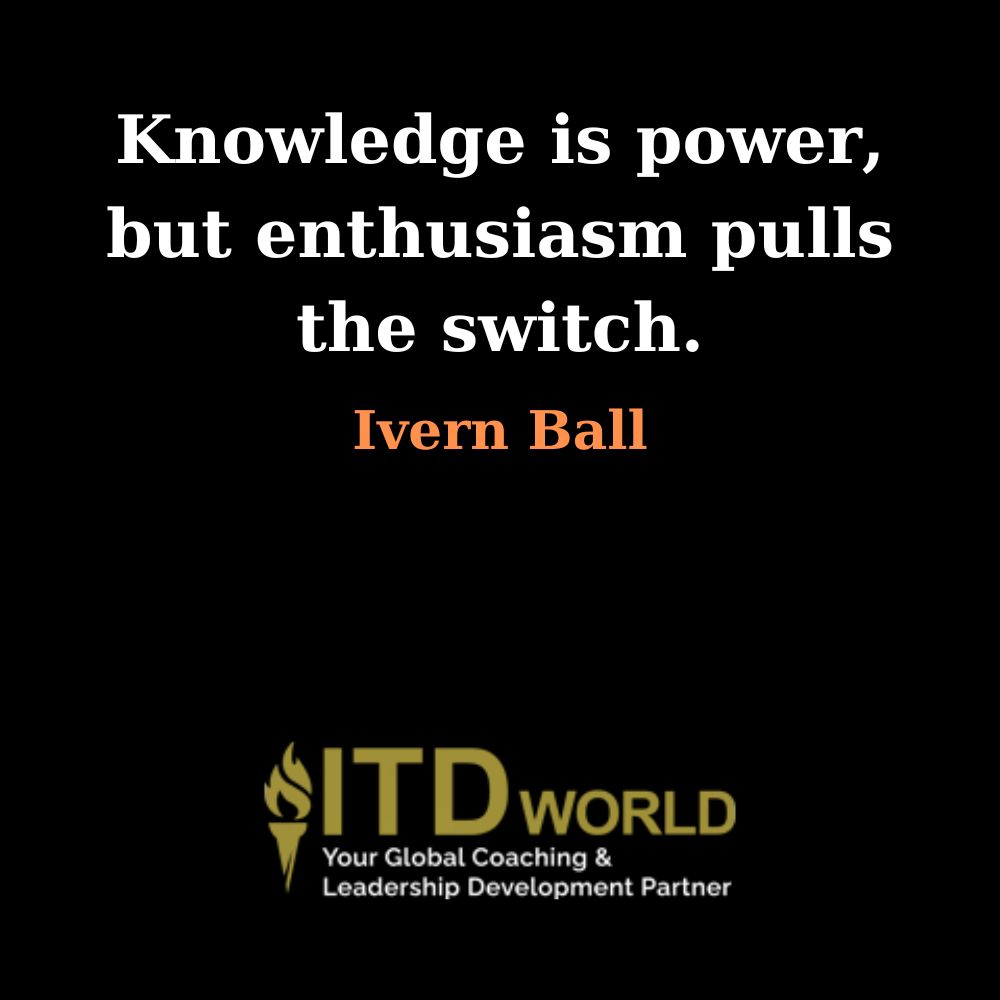
Inspirational training quotes
“Learning is not attained by chance, it must be sought for with ardor and attended to with diligence.”
Abigail Adams
Training programs, while providing avenues for knowledge, are not magical potions guaranteeing instant expertise. Rather, it’s the individual’s zeal and perseverance that propel their learning journey forward – driving them to explore further and push beyond their boundaries.
However, passion alone is not enough. Learning demands diligence – a steadfast commitment to consistent effort and practice. It’s about showing up every day, dedicating time and focus to mastering new skills, and persevering through obstacles. True learning requires an unwavering dedication to the process, not just flashes of inspiration.
“The expert in anything was once a beginner.”
Helen Hayes
Even the most skilled professionals, the ones who inspire awe with their knowledge and abilities, were once novices, fumbling through the same uncertainties and challenges we face. By acknowledging this simple truth, we unlock the power of the “beginner’s mindset” – characterized by curiosity, openness to learning, and a willingness to embrace mistakes as stepping stones. With such an attitude in place, we are better equipped to approach learning and development without the burden of perfectionism, instead focusing on the joy of discovery and the thrill of progress.
“Education is not preparation for life; education is life itself.”
John Dewey
The traditional view of training positions it as a means to an end, a prelude to a future career, or a stepping stone to achieving specific goals. But here, Dewey deconstructs this linear perspective, reminding us that the present moment, the act of learning and growing, is itself brimming with purpose and value. Training, then, becomes an ongoing dialogue with the world, a continuous dance of discovery and engagement, not just a way to earn a paycheck or unlock future opportunities.
Just as oxygen sustains our physical bodies, learning fuels our minds and spirits. It keeps us curious, engaged, and alive to the possibilities that surround us. Training programs, when designed effectively, provide opportunities for intellectual exploration, creative expression, and critical thinking. These experiences nourish our inner landscapes, sparking new ideas, igniting passions, and shaping our perspectives on the world.
The act of learning is not only about accumulating knowledge; it’s about transforming ourselves. Through training, we develop new skills, refine our talents, and challenge our existing beliefs. We confront our biases, expand our empathy, and learn to see the world from different perspectives. This constant evolution shapes who we are as individuals, forging us into adaptable, resilient, and compassionate people.
“Learning never exhausts the mind.”
Leonardo da Vinci
Learning should never be driven by obligation – rather, by an insatiable thirst for understanding the world around us. This inherent curiosity serves as the fuel that propels us to explore, question, and delve deeper. Training programs, when designed effectively, tap into this natural curiosity, presenting knowledge as an exciting adventure, instead of a tiresome burden.
Read more: 50 Critical Thinking Quotes – Insights for Sharpening the Mind
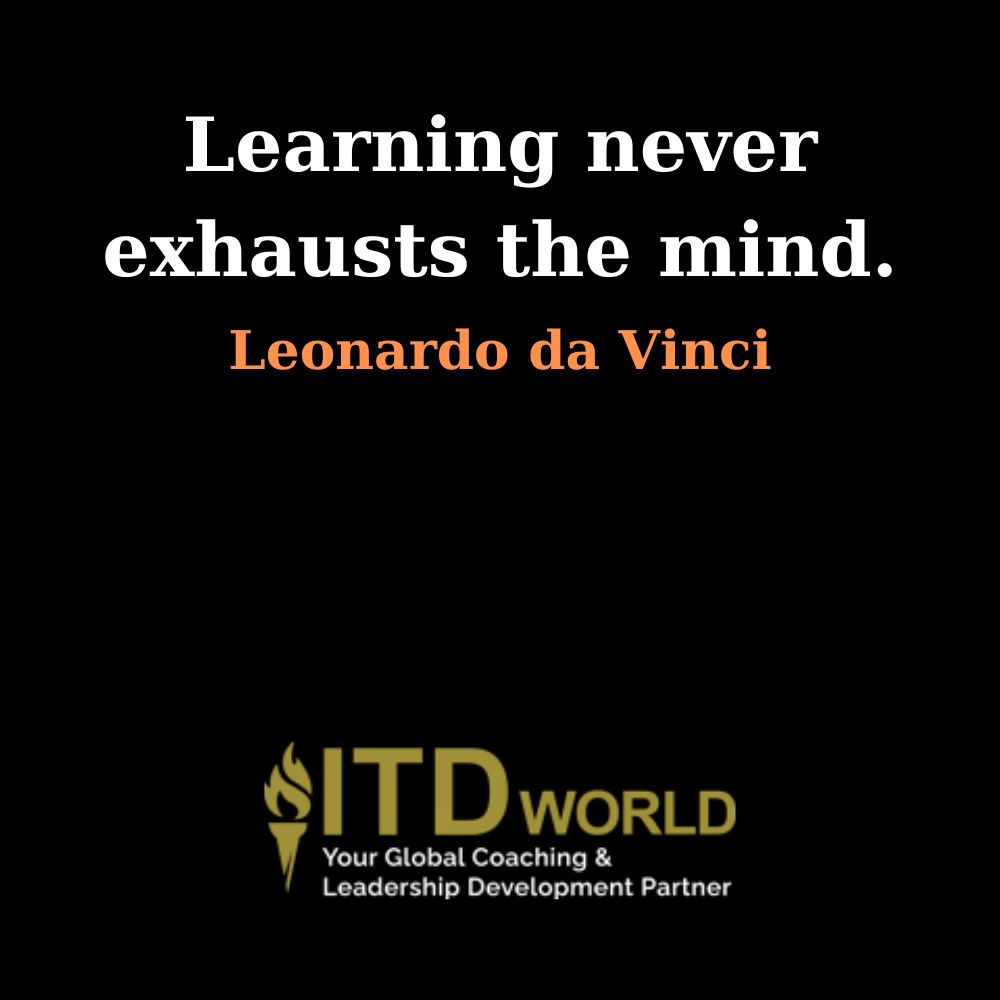
Inspirational training quotes
“Live as if you were to die tomorrow. Learn as if you were to live forever.”
Mahatma Gandhi
The quote encourages us to approach each learning experience with an awareness of its value and a commitment to extracting the most from it. Every training session, every challenge, every piece of feedback becomes an opportunity to live with purpose and make the most of the present moment. Additionally, learning should be something we do for a lifetime. Regardless of age or circumstance, we are to keep the flame of curiosity burning inside us.
“Your life does not get better by chance; it gets better by change.”
Jim Rohn
Significant and lasting change, both personally and professionally, requires conscious effort and a commitment to growth. Training, then, becomes the fertile ground where individuals cultivate the skills, knowledge, and mindsets necessary to actively shape their own paths.

Inspirational training quotes
Read more: 65 Curiosity Quotes – Ignite the Mind & Drive Success
Training and Development Quotes
“Training is a catalyst that can transform lives, companies, and even nations.”
Tony Robbins
For individuals, training is a transformative spark that helps unlock potential, cultivate knowledge and skills, and propel them forward on their personal and professional journeys. Consider someone grappling with personal challenges – training in communication, problem-solving, or emotional intelligence may provide the tools for them to navigate difficulties and build resilience.
At an organizational level, effective training acts as a potent fuel for success. It equips employees with the skills and mindsets necessary to adapt to changing markets, embrace new technologies, and optimize performance.
Training is not just about imparting knowledge; it’s about igniting the fires of transformation. By nurturing the ingredients that fuel its catalytic power, we can unleash its potential to empower individuals, build thriving organizations, and shape a brighter future for all.
“Development is about transforming the lives of people, not just transforming economies.”
Joseph E. Stiglitz
When we invest in the training and development of people, we don’t just create skilled workers; we are contributing to the establishment of healthier communities made up of engaged individuals. Effective skill training initiatives equip participants with skills like communication, critical thinking, and problem-solving, enhancing their personal growth and resilience.
“Your education is a dress rehearsal for a life that is yours to lead.”
Nora Ephron
We are not merely passive actors following a preordained script; instead, we are the directors, the writers, and the lead actors in our own lives. Training empowers us to take ownership of our journeys, make informed choices, and lead with purpose and passion. It allows us to rewrite the script when needed, embrace improvisation when faced with unexpected twists, and ultimately, create a life that is truly our own.

Inspirational training quotes
“To bring about change, you must not be afraid to take the first step. We will fail when we fail to try.”
Rosa Parks
Significant change, whether personal or professional, rarely arrives through passive waiting. Rather, we must dare take the first step, to actively seek out learning opportunities that push us beyond our comfort zones – and equip us with the tools and skills necessary to create positive change.
The greatest risk of life lies not in failure, but in failing to try at all. Training, then, becomes springboards for ongoing learning and exploration, encouraging individuals and organizations to adapt, iterate, and constantly strive for improvement. Training programs, especially those focused on innovation and personal growth, will inevitably involve experimentation, exploration, and even occasional missteps. However, it’s these very stumbles that offer valuable lessons and opportunities for growth.
“The capacity to learn is a gift; the ability to learn is a skill; the willingness to learn is a choice.”
Brian Herbert
As human beings, we all possess the capacity for intellectual and emotional growth. Training programs, then, become fertile ground where this potential can be nurtured and cultivated. That said, such initiatives should not be passive – their aim should be to equip individuals with the tools and strategies necessary to effectively absorb, process, and retain knowledge. Most importantly, they should be designed in a way that fosters the intrinsic motivation to learn and step out of one’s comfort zone.
Learning is a dynamic dance between inherent potential, cultivated skills, and the unwavering choice to embrace growth. By recognizing and nurturing all three elements, we can unlock the true transformative power of learning and empower ourselves to become lifelong learners.
“Train people well enough so they can leave. Treat them well enough so they don’t want to.”
Richard Branson
The seemingly opposing sentiments in this quote hold a profound wisdom. It challenges the traditional one-dimensional approach – and offers a holistic perspective on creating a truly thriving learning environment.
The traditional view of training often focuses on retention, on equipping employees with the skills necessary to perform their jobs effectively and deterring them from seeking opportunities elsewhere. However, Branson’s quote challenges this static approach, advocating for a model that prioritizes growth and development.
Nowadays, talented individuals are not confined by walls or titles; they are driven by a desire to learn, contribute, and reach their full potential. As such, by providing a supportive environment that encourages open communication, recognizes individual strengths, and offers opportunities for advancing in one’s path, organizations create a workplace where people feel valued and motivated to stay – not because they are comfortable, but because they are continually challenged and inspired to break through their limits.
Read more: Learning and Development Quotes to Fuel Your Growth
Powerful Training Hard Quotes
“It’s not about perfect. It’s about effort. And when you bring that effort every single day, that’s where transformation happens. That’s how change occurs.”
Jillian Michaels
During the quest for knowledge, we often get caught up in the pursuit of perfect outcomes, immaculate performances, and error-free applications of skills. However, the real magic lies in the journey, in the daily grind of practice, exploration, and overcoming challenges. It’s about showing up, giving it your all, and embracing the imperfections that are part of the learning process.
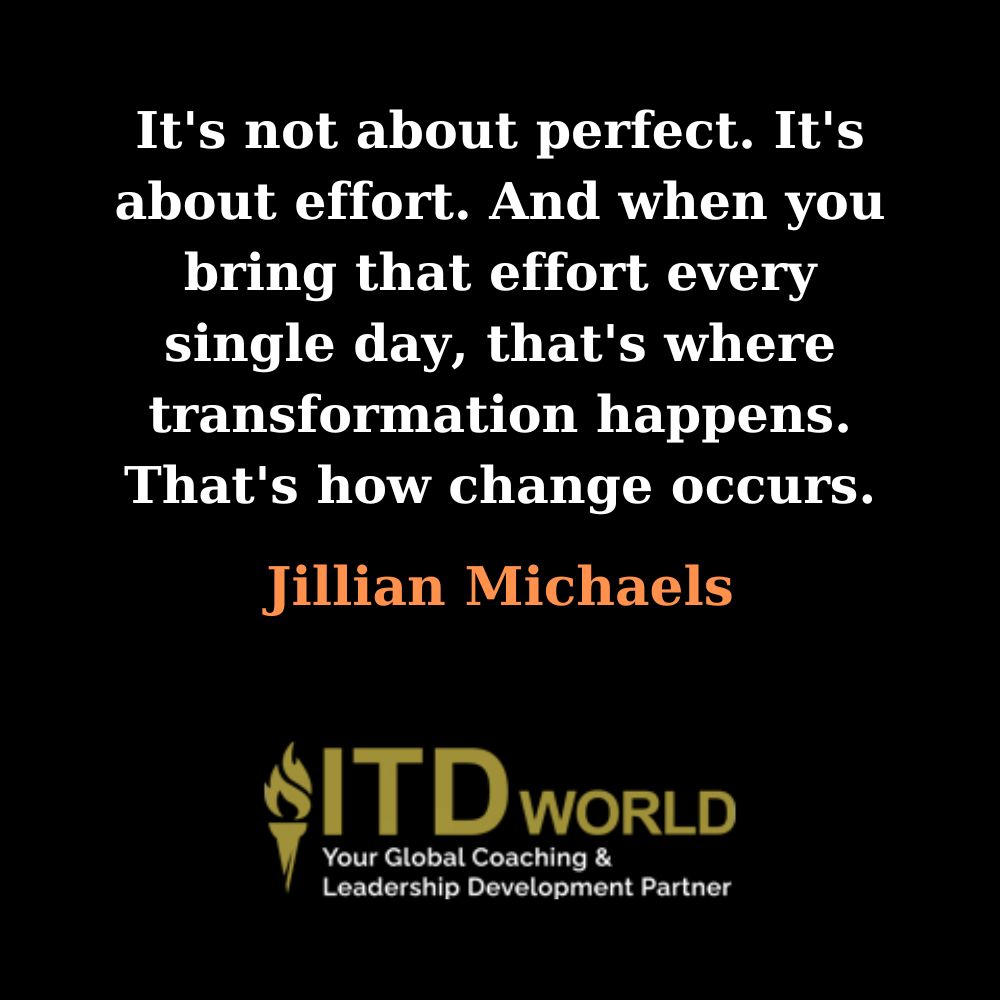
Inspirational training quotes
“You have to believe in yourself when no one else does – that makes you a winner right there.”
Venus Williams
When we doubt ourselves, we limit our potential and stifle our growth. On the other hand, belief in our ability to learn, adapt, and overcome obstacles enables us to unlock a potent source of motivation and resilience that fuels the engine of progress and propels us forward through challenges.
“Success is no accident. It is hard work, perseverance, learning, studying, sacrifice, and most of all, love of what you are doing or learning to do.”
Pelé
Dedicated learning requires us to make inevitable sacrifices. Time, comfort, and sometimes even opportunities may need to be relinquished in pursuit of a skill or knowledge. That said, these are investments – necessary contributions to the construction of a larger goal. As such, we are called to work hard, persevere through challenges, embrace the joy of learning, and, most importantly, allow our passion to guide us on the journey toward crafting our own unique definitions of success.
Read more: 55 Growth Mindset Quotes – Insights for Business & Life
Learning & Training Journey Quotes
“The journey of a thousand miles begins with a single step.”
Lao Tzu
The most ambitious skill development journeys, the mastery of complex fields, and the transformation of ourselves, all begin with a single act of courage – the decision to take that first step. The quest for knowledge often feels daunting, filled with mountains of information, intricate skills, and seemingly insurmountable challenges that make us susceptible to procrastination, inertia, and even complete avoidance. However, we need to break free from this overwhelm and focus on taking action.
While the first step itself may seem insignificant, it signifies the initiation of a journey, a commitment to progress. Each subsequent step, regardless of its size, builds upon the previous one, gradually accumulating into a powerful force for advancement.
“Every expert was once a beginner. Embrace the journey.”
Robin Sharma
A simple, yet profound reminder that mastery in any field is a result of continuous learning and growth. This training quote urges us to shed the fear of imperfection and instead embrace the messy, enriching process of acquiring new skills and knowledge.
Every single expert, every seasoned professional whose name evokes awe in their field, was once a fumbling novice, taking their first tentative steps into the unknown. They stumbled, they made mistakes, and they grappled with concepts that seemed impossibly complex. But what set them apart was their ability to embrace this beginner phase, to see it not as a temporary state of inadequacy, but as a crucial first chapter in their journey towards expertise.
Embracing the journey means accepting that learning is rarely a linear path. There will be detours, roadblocks, and moments of utter confusion. We’ll hit plateaus, encounter setbacks, and question our own abilities. But it’s precisely these challenges that shape us, that hone our critical thinking, and that ultimately make us better learners.
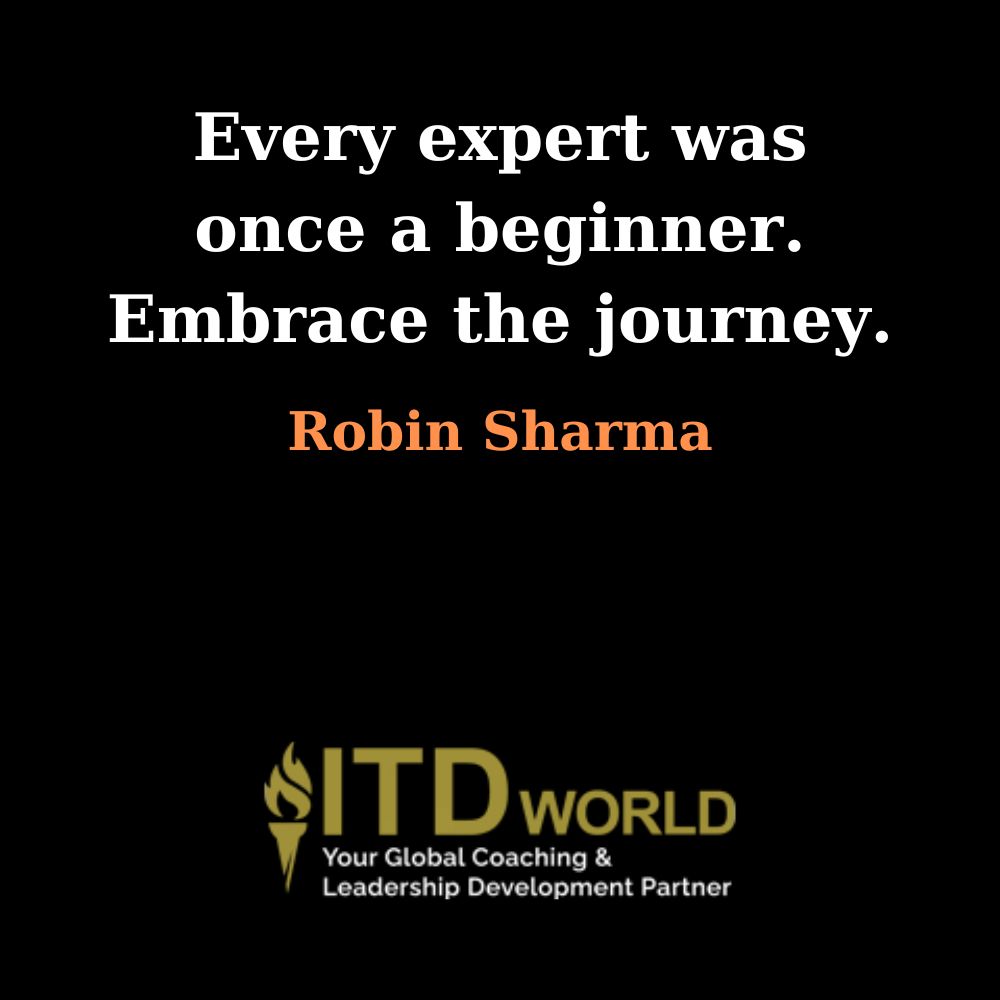
Inspirational training quotes
“Success is a journey, not a destination.”
Arthur Ashe
The beauty of our life journey lies in the constant flux, the unending stream of discoveries that keep us engaged and motivated. Every hurdle overcome, every skill mastered, becomes a stepping stone, propelling us forward on the path of growth. The satisfaction lies not in the final accomplishment – but mainly, in the thrill of the chase, the joy of unearthing new possibilities, and the unwavering commitment to becoming the best version of ourselves.
This journey-oriented approach to learning fosters a mindset of continuous improvement. It liberates us from the pressure of attaining fixed destinations and instead encourages us to celebrate the incremental progress we make every day.
In the context of training, such a perspective encourages us to focus less on rigid curriculums and predetermined outcomes – and more on creating a dynamic environment that fosters curiosity, exploration, and a love for lifelong learning. Trainers become facilitators, guiding their charges on the journey rather than dictating the destination. The emphasis shifts from simply acquiring skills to nurturing a growth mindset, fostering a passion for continuous learning, and preparing individuals to adapt and thrive in an ever-changing world.
“The best view comes after the hardest climb.”
Unknown
The “best view” represents the summit of understanding, the point where newly acquired knowledge grants us a panoramic perspective on the subject we’ve been scaling. It’s the moment when years of effort coalesce into a dazzling comprehension, when once-opaque concepts shimmer with clarity, and the intricate connections between ideas dance before our minds like constellations in a starlit sky.
But reaching this peak demands traversing the “hardest climb.” This climb isn’t a singular, monolithic beast; it’s a labyrinth of obstacles, each testing our commitment and grit. There will be plateaus of frustration, where progress feels glacial and motivation wanes. Doubt will gnaw at our resolve, whispering temptations to retreat to the familiar lowlands of ignorance.
But the beauty of this challenging ascent lies in the transformation it engenders. Each step, each struggle, hones our cognitive muscles. We develop resilience, the ability to bounce back from setbacks and push through fatigue. We cultivate mental dexterity, navigating through dense layers of information with the grace of an experienced mountaineer. Most importantly, we learn to cherish the process itself, finding joy in the thrill of discovery, the satisfaction of overcoming hurdles, and the camaraderie of shared effort with fellow learners.
“The journey is the reward.”
Chinese Proverb
Traditionally, we view learning as a means to an end, a ladder we climb to reach the plateau of expertise. We fixate on the final grade, the coveted certification, the tangible evidence of our ascent. But the “journey is the reward” philosophy asks us to dismantle this ladder, to lie down in the verdant meadow of the present, and savor the richness of the learning experience itself.
This focus on the journey fosters a love for lifelong learning. The pressure to reach a fixed endpoint evaporates, replaced by the intrinsic motivation to continually expand our horizons. Additionally, it also fosters a sense of community on the path of knowledge. We connect with fellow learners not as competitors vying for the same prize, but as companions sharing the wonder of the unknown. We learn from each other’s stumbles, celebrate each other’s triumphs, and offer support on the treacherous climbs.
Read more: 45 Skill Development Quotes to Fuel Learning & Mastery

Inspirational training quotes
Training Quotes for Work & Business
“Your work is going to fill a large part of your life, and the only way to be truly satisfied is to do what you believe is great work.”
Steve Jobs
Work often consumes a significant portion of our waking hours. To dedicate such a vast chunk of our life to something purely transactional – devoid of meaning or personal connection – is a recipe for unfulfilled potential and gnawing dissatisfaction. The key to unlocking true satisfaction lies in aligning our work with what we believe is “great.”
However, what constitutes “great work” is a question unique to each person. It might lie in pushing the boundaries of innovation, crafting solutions that alleviate human suffering, creating art that evokes emotion, or contributing to a cause that transcends self-interest. The essence of “great work” lies in its ability to ignite our intrinsic motivation, connect us to something larger than ourselves, and fill our days with a sense of purpose and accomplishment.
This pursuit of “great work” demands a journey of exploration and self-discovery. It requires continuous learning and training to uncover our passions, identify our strengths, and delve into fields that spark curiosity and ignite our imagination. We must become relentless investigators of our desires, sifting through experiences, testing different paths, and learning from both successes and failures – until we uncover the work that resonates at the core of our being.
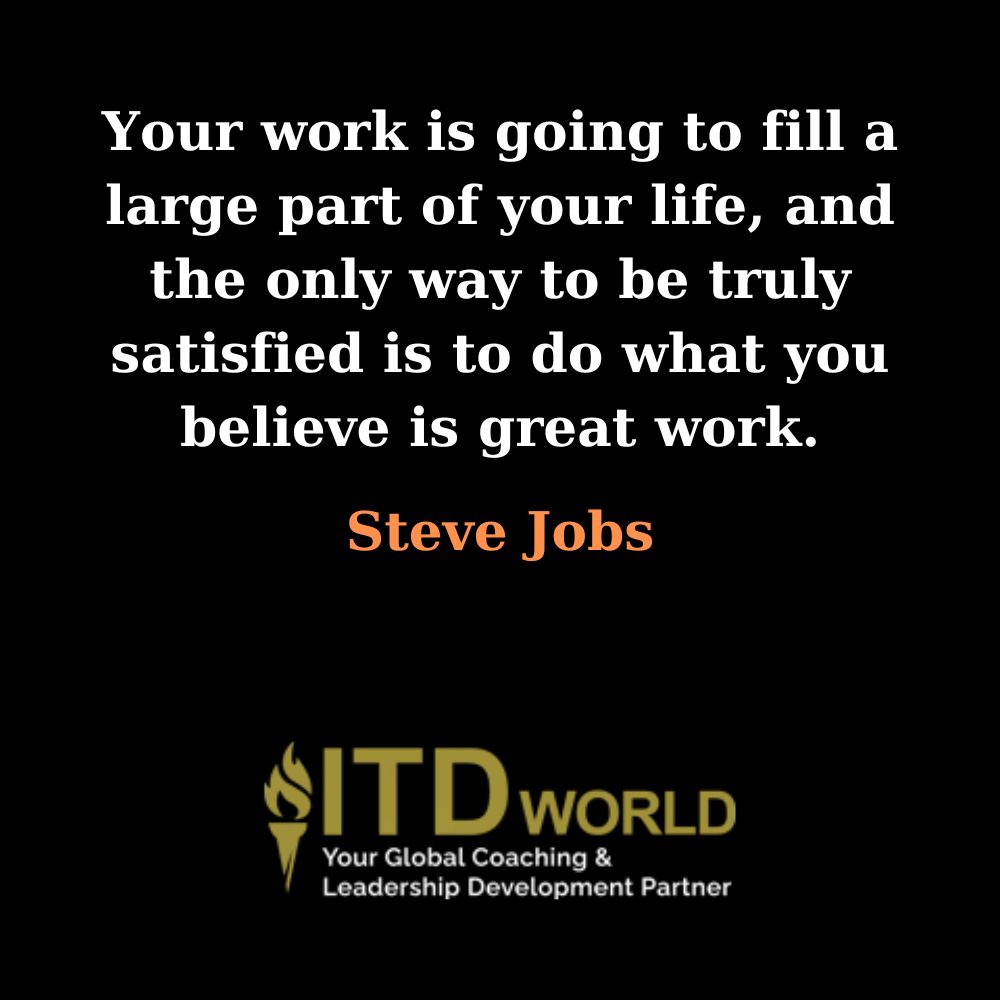
Inspirational training quotes
“Success is the sum of small efforts, repeated day in and day out.”
Robert Collier
Success is not a dazzling fireworks display erupting in a single, spectacular moment; rather, it is like a warm, flickering flame nurtured by the steady hand of daily effort. Every minute spent practicing, every concept grasped, every hurdle overcome, contributes a precious ember to this flame.
Mastery is a dance with time, a gradual unfolding of potential driven by unwavering commitment. There will be days when progress feels glacial, doubts gnaw at our resolve, and the summit of expertise seems shrouded in impenetrable mist. But it’s precisely in these moments that the value of daily effort shines brightest.
“Job training empowers people to realize their dreams and improve their lives.”
Sylvia Mathews Burwell
Dreams, those aspirational whispers lodged deep within our hearts, often remain just that – nebulous desires yearning for manifestation. Job training acts as a potent catalyst, providing the tools and skills necessary to translate those dreams into tangible realities. Whether it’s the aspiring chef honing their culinary prowess, the budding programmer mastering the language of code, or the single mother acquiring the skills to enter the workforce and secure a better life for her family, training empowers individuals to bridge the gap between aspiration and achievement. Furthermore, it equips us to reclaim control of our narratives – and rewrite them with newfound confidence.
“Do not wait to strike till the iron is hot, but make it hot by striking.”
William Butler Yeats
“Making the iron hot by striking” embodies the essence of proactive learning. It’s about taking the initiative, seeking out knowledge, and relentlessly pushing ourselves to grow. It’s about embracing discomfort, venturing into the unknown, and forging new skill sets through the fires of challenge and experimentation.
When we become the conductors of our own growth, the act of learning transforms from a chore into a thrilling adventure. Each obstacle overcome, each concept grasped, becomes a testament to our agency, fueling our intrinsic motivation and propelling us forward. We discover the joy of creation, the satisfaction of sculpting our minds, and the exhilarating dance between effort and accomplishment.
Read more: Human Resource Management Quotes to Empower HR Professionals
Professional Training Quotes
“An investment in knowledge pays the best interest.”
Benjamin Franklin
Investing in knowledge isn’t about plopping down a sum of money and passively awaiting returns. Rather, it’s about an active, ongoing commitment to the pursuit of understanding. It’s about carving out time and energy to read, study, experiment, engage in stimulating conversations, and immerse oneself in new experiences. Every minute spent learning, every concept grasped, every skill honed becomes a valuable deposit in the bank of our intellectual capital.
The “interest” paid on this investment is manifold and ever-evolving. It whispers in the thrill of uncovering a new perspective, in the satisfaction of overcoming a challenging problem, in the confidence gained from mastering a new skill. It manifests in the ability to navigate the complexities of our world with greater clarity, in the enhanced capacity for critical thinking and problem-solving, and in the newfound confidence to tackle unexpected challenges.
“Education is the passport to the future, for tomorrow belongs to those who prepare for it today.”
Malcolm X
Education, far from being a restrictive gatekeeper, becomes a document granting access to a world brimming with possibility. It isn’t solely for securing prestigious jobs or academic accolades – but for navigating the complexities of our interconnected world, understanding diverse perspectives, and shaping a future filled with personal fulfillment and positive impact.
But this passport has a caveat: it demands preparation. Tomorrow’s opportunities belong not to those who passively await their turn, but to those who actively equip themselves with the knowledge, skills, and adaptability required to seize them. Education, in this context, transcends the confines of classrooms and textbooks; it encompasses curiosity, critical thinking, and a willingness to embrace lifelong learning.
This focus on preparation fosters a sense of agency and empowerment. It liberates us from the passive stance of waiting for the future to unfold and instead equips us with the tools to actively craft it. By honing our critical thinking skills, we learn to analyze challenges, navigate uncertainties, and formulate creative solutions.
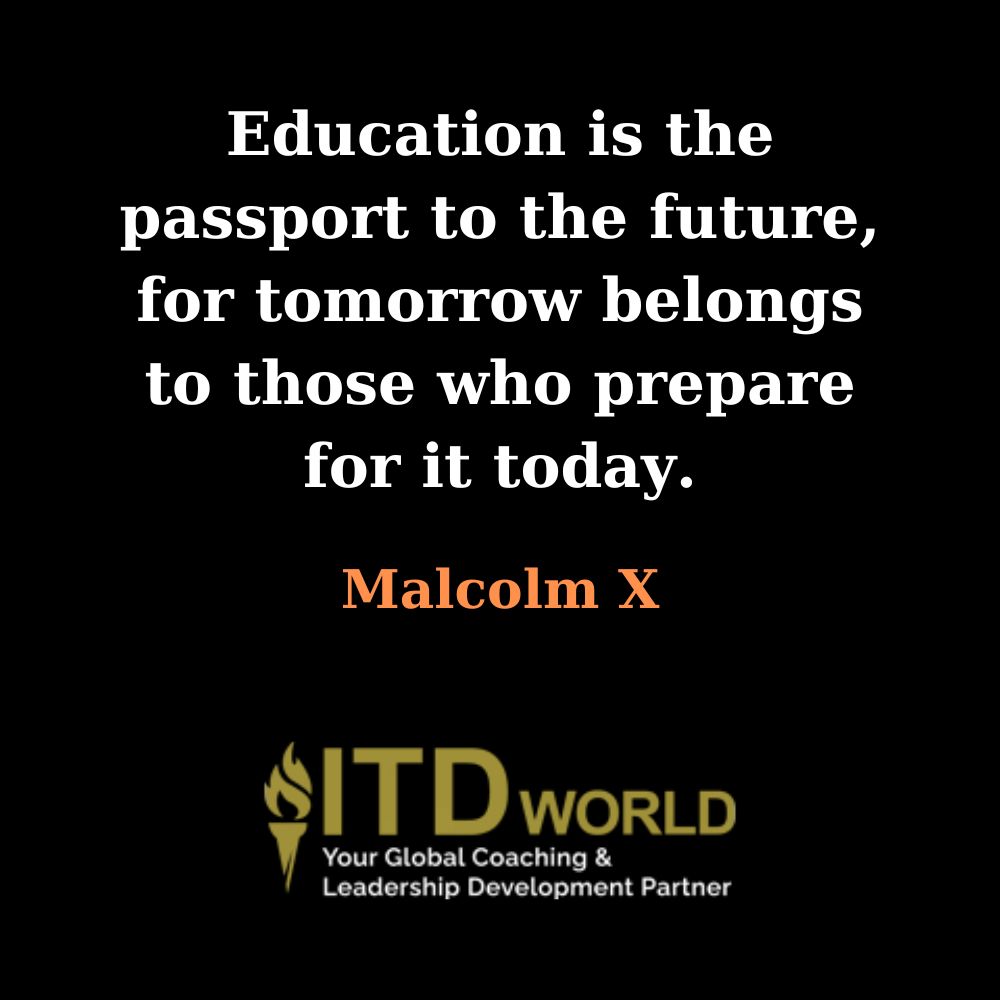
Inspirational training quotes
“Formal education will make you a living; self-education will make you a fortune.”
Jim Rohn
“Self-education” – the act of actively seeking knowledge and honing skills beyond the confines of prescribed curriculums – is the key to unlocking a “fortune” of possibilities. Here, fortune transcends mere financial gain; it encompasses deeper personal growth, intellectual mastery, and the freedom to pursue passionate endeavors.
This emphasis on self-education encourages us to become architects of our learning journeys. We delve into subjects that spark our curiosity, experiment with new skills, and challenge ourselves to think critically and creatively. We become lifelong learners, constantly seeking new knowledge and experiences that ignite our passions and push the boundaries of our understanding.
“Education is not the filling of a pail, but the lighting of a fire.”
W.B. Yeats
The true value of learning lies not in the accumulation of facts, but in the spark it ignites within us. It’s a call to embrace the transformative potential of learning, to dance with ideas, to challenge assumptions, and to let the flames of curiosity light our way toward a brighter future. In addition, we must aim to constantly expand our horizons. Just as a fire needs constant tending to keep it from flickering out, learning requires regular engagement and practice. We must revisit concepts, apply them in new contexts, and challenge ourselves to keep the flames burning bright.
Read more: 60 Talent Quotes – Inspire, Develop, and Lead
Training Leadership Quotes
“The growth and development of people is the highest calling of leadership.”
Harvey S. Firestone
At its core, this training quote challenges the traditional notion of leadership as a position of authority, a top-down hierarchy where success hinges on wielding power and dictating directives. Instead, it elevates the development of people as the true north of leadership, a commitment to nurturing the seeds of potential within each individual and cultivating a fertile ground for their growth.
This focus on people-centric leadership stems from a profound understanding of human potential. Leaders who embrace this philosophy recognize that every individual harbors a universe of untapped talent, unique skill sets, and hidden strengths. Their calling, then, becomes the noble act of identifying these embers, fanning them into flames, and fostering an environment where individuals can blossom into the best versions of themselves.
A people-centric approach like this demands a shift in leadership training methodologies. Organizations are called to move beyond the confines of technical skills and strategic planning, focusing on cultivating empathy, emotional intelligence, and the ability to inspire and motivate others. Leaders need to be equipped with the tools to identify individual strengths and weaknesses, provide constructive feedback, and create personalized development plans that empower individuals to take ownership of their growth journey.
“Leaders are more powerful role models when they learn than when they teach.”
Rosabeth Moss Kanter
Learning, not teaching, is the most potent form of leadership development. By embracing a posture of constant exploration, leaders demonstrate humility and a commitment to lifelong growth. This vulnerability resonates deeply with followers, fostering a sense of relatability and trust.
When leaders aren’t afraid to step out of their comfort zones, ask questions, and admit to not knowing everything, they create a safe space for others to do the same. The result is a culture of open communication, intellectual curiosity, and collaborative learning, where everyone feels empowered to learn and grow together.
All in all, when leaders choose to learn, they not only illuminate their paths – but also pave the way for others to discover their own brilliance. They are no longer distant figures on a pedestal; rather, they become a relatable guide, walking alongside and offering encouragement on the path to self-improvement.
Read more: Leadership Quotes – Daily Doses of Inspiration to Unlock Greatness
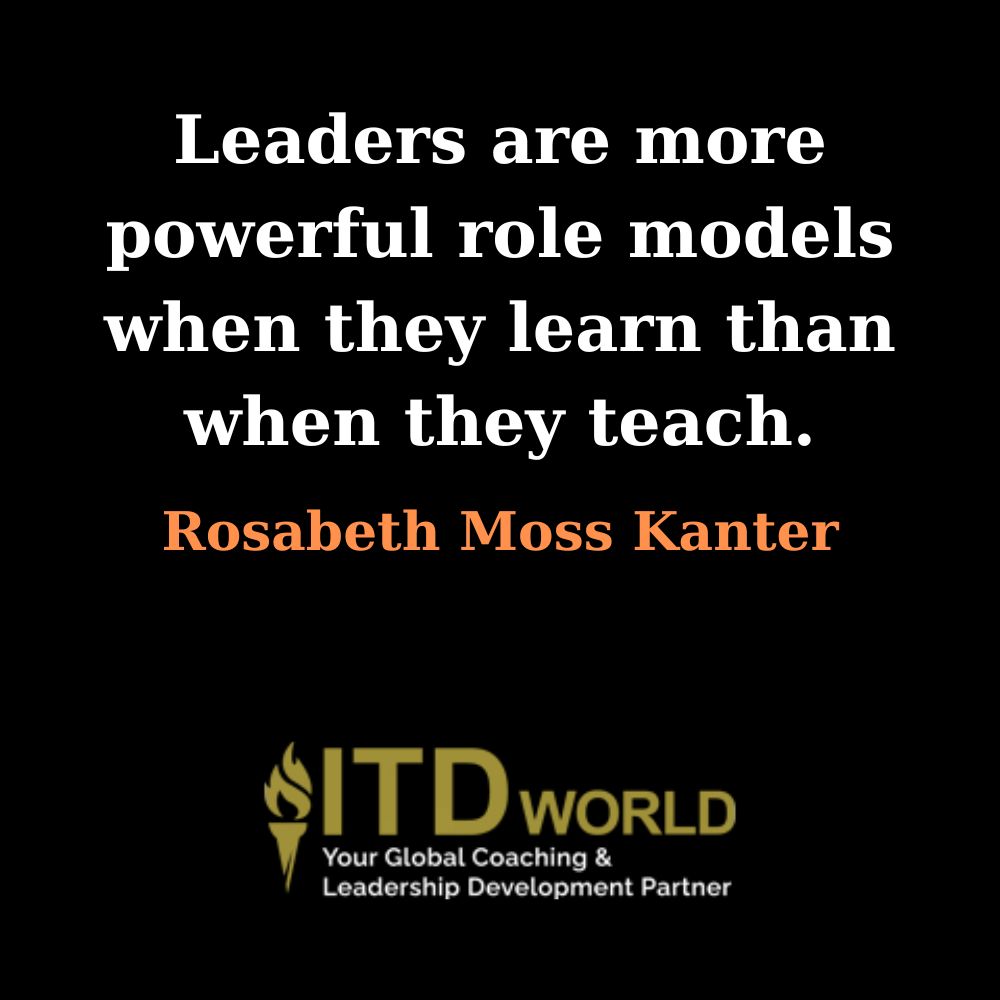
Inspirational training quotes
“Leadership and learning are indispensable to each other.”
John F. Kennedy
Leadership, at its core, requires knowledge, vision, and adaptability. It’s about navigating uncharted waters, inspiring others to follow, and making tough decisions when the map crumbles. But where does one acquire these skills if not through learning? A leader frozen in the knowledge they gleaned yesterday is ill-equipped to face the dynamic challenges of tomorrow. This is where training enters the stage, not as a mere ornament, but as the fuel that propels leadership upwards.
Training serves as the fertile ground where leadership blossoms. It’s the crucible where experiences are forged, new perspectives are explored, and critical thinking muscles are toned. Through targeted programs, leaders dissect case studies, engage in simulations, and receive feedback from diverse perspectives. This constant honing allows them to refine their decision-making, sharpen their communication skills, and build the resilience needed to weather storms.
However, the relationship is not unidirectional. Leadership, in turn, nourishes the very learning it depends on. A leader who actively promotes a culture of learning within their team creates an environment where everyone is encouraged to explore, question, and evolve. This open exchange of ideas enables them to gain invaluable insights from the collective wisdom of their team. Additionally, those who demonstrate a commitment to their ongoing growth inspire others to do the same, setting a powerful example that ripples throughout the organization.
Read more: Leadership Coaching Quotes to Empower Long-term Success
“Leaders will be those who empower others.”
Bill Gates
True leadership lies not in wielding authority, but in unlocking the potential within others. Training plays a crucial role in equipping aspiring leaders with the tools and mindset needed to become effective empowerers. This goes beyond traditional skills like communication and decision-making. It delves into fostering:
- Trust and delegation: A leader who empowers trusts their team members, believes in their abilities, and delegates tasks with clear expectations and support.
- Mentorship and coaching: Effective leaders become mentors, guiding and supporting their team members’ growth. Training can equip them with coaching skills, active listening techniques, and the ability to provide constructive feedback that fosters development.
- Celebrating individuality and diversity: Recognizing and valuing the unique strengths and perspectives of each team member is key to unlocking their full potential.
- Creating a culture of learning: An empowered team is a learning team. Leaders who empower create an environment where continuous learning is encouraged, mistakes are seen as opportunities for growth, and knowledge is shared freely. Training can focus on building a culture of open communication, feedback loops, and knowledge-sharing initiatives.
Read more: Coaching Quotes – Illuminate the Path to Greatness

Inspirational training quotes
Final Thoughts
And that concludes our list of inspirational messages for training. Whether you’re striving to hone your professional skills or simply committed to lifelong learning, the power of these words extends beyond their eloquence. They are catalysts for action, driving us to embrace challenges, overcome obstacles, and emerge stronger on the other side. May these training quotes help you maintain a mindset of continuous improvement – and a commitment to the transformative power of learning!
Other resources you might be interested in:
- Mentoring Quotes: Lessons Learned, Inspiration Shared
- Train the Trainer Model: Investing in Excellence
- Training Needs Analysis (TNA): From Insight to Impact
- Situational Leadership: A How-to Guide
- Talent Management: Strategies for Organizational Success

